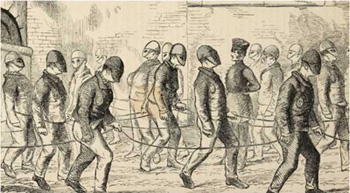Prisoners, Medical Care and Entitlement to Health in England and Ireland, 1850-2000
Professor Hilary Marland, Centre for the History of Medicine (Warwick), and co-Principal Investigator Dr Catherine Cox (University College Dublin), have commenced work on a major five-year project, funded by a Wellcome Trust Senior Investigator Award, exploring health in prison.
- Visit our project website
 Follow us on Twitter
Follow us on Twitter - Find us on Facebook
- Join our mailing list Read Issue 1: Mar 17 Issue 2: April 17 Issue 3: June 17 Issue 4: October 17 Issue 5: November 17 Issue 6: December 17 Issue 7: Feb 18 Issue 8: April 18 Issue 9: May 18
Project Aims
- the very high incidence of mental health problems amongst prisoners
- the health of women, and maternity services in prison
- the link between nutrition and health in prison
- the harmful impact of prison on young offenders
- reform organisation and reintegration into the community
- political prisoners, hunger strikes, and health
- responses to addiction and HIV/AIDS.
- who advocates for prisoners’ health?
- to what extent are prisoners deemed entitled to health care?
- how do debates on human rights influence the provision of medical care for prisoners?

- to what extent are prison doctors constrained by dual loyalty to the prison service and to prisoners themselves, their patients?
The project is engaged with policy makers and prison reform organisations, and is running several policy workshops. It will result in several public outreach projects, including a commissioned theatrical production and artwork. If you would like to be added to our mailing list for updates on our work please contact us.
A publication, 'History, Arts and Public Engagement', draws together learning from our collaborations with arts organisations between 2017-18, as we showcased our research and findings in new ways and encouraged wider publics to think about the health and welfare of prisoners through the prism of history.
